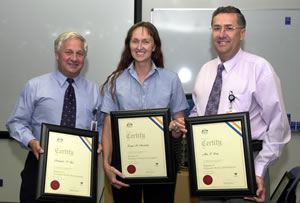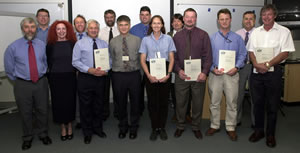
The first ATSB graduates from the recently accredited Diploma of Transport Safety Investigation were presented with their awards on 18 October 2002.
Senior ATSB investigators Alan Stray, Kit Filor and Kerryn Macaulay received their Diplomas after successfully completing the streamlined assessment process aimed at recognising prior learning and current competency.
Awards were also made to 12 staff who successfully completed a Certificate Level 4 course in Assessment and Workplace Training. This qualifies them to train and assess at the Diploma level.
The awards are the first since the Bureau received its recent national accreditation for the Diploma program and accreditation as a Registered Training Organisation (RTO).
In presenting the awards Kym Bills, Executive Director of the Bureau, noted that the transport safety investigation course is believed to be the first of its type in the world. There has been domestic and international interest in the course already expressed from industry, transport regulatory authorities and other government bodies.
Mr Bills noted that this is an excellent achievement for the Bureau and re-inforces the world-wide standing of ATSBs safety investigation capability.
The Diploma course is aimed at providing basic investigation training to investigators in air, marine and rail transport modes. The course offers a structured learning framework through a combination of formal course work, self-paced learning guides and on-the-job training to provide trainees with the essential knowledge, skills, experience and competencies.
Duration of the course will vary according to current competency and prior learning, but new recruits could complete the course in 18 months as an integral part of their work in the Bureau. The course also links to investigator Work Level Standards.
The Diploma program will cover a range of generic and technical competencies relevant to transport safety investigation. These include technical report writing, data collection and analysis, and the final competency of managing a (less complex) transport safety investigation.
Development of the course commenced in 2000 when the Bureau identified the need for a vocational educational and training qualification to address the requirements of Transport Safety Investigators. The Bureau realised that a structured learning program would be necessary to develop the skills of new recruits before more experienced investigators leave the organisation. In addition, the Diploma could also prove useful in the context of the increasingly litigious environment in which the Bureau operates.
With the focus of the Bureau on no-blame safety investigations, it was not possible to simply adopt existing investigation courses aimed at apportioning fault or blame. The Bureau, with assistance from the Canberra Institute of Technology (CIT) Solutions, developed its own enterprise-specific standards consistent with its no-blame safety investigation philosophy and the Bureaus international obligations and legislation.
In addition to offering a Diploma for successful completion of the full course, the Bureau may now also offer Certificates to successful external candidates of short courses conducted by the Bureau such as the well-known course on Human Factors for Investigators.

Administration of the RTO will be in accordance with the national standards issued by the Australian Quality Training Framework. All aspects of the course will be continually monitored and evaluated to ensure the training remains effective and relevant to the needs of the Bureau.
Opportunities may exist for commercial development of the course. However, the immediate ATSB priority is to ensure ATSB staff obtain the full benefit from what the course has to offer to maintain Australias position at the forefront of transport safety investigation.


